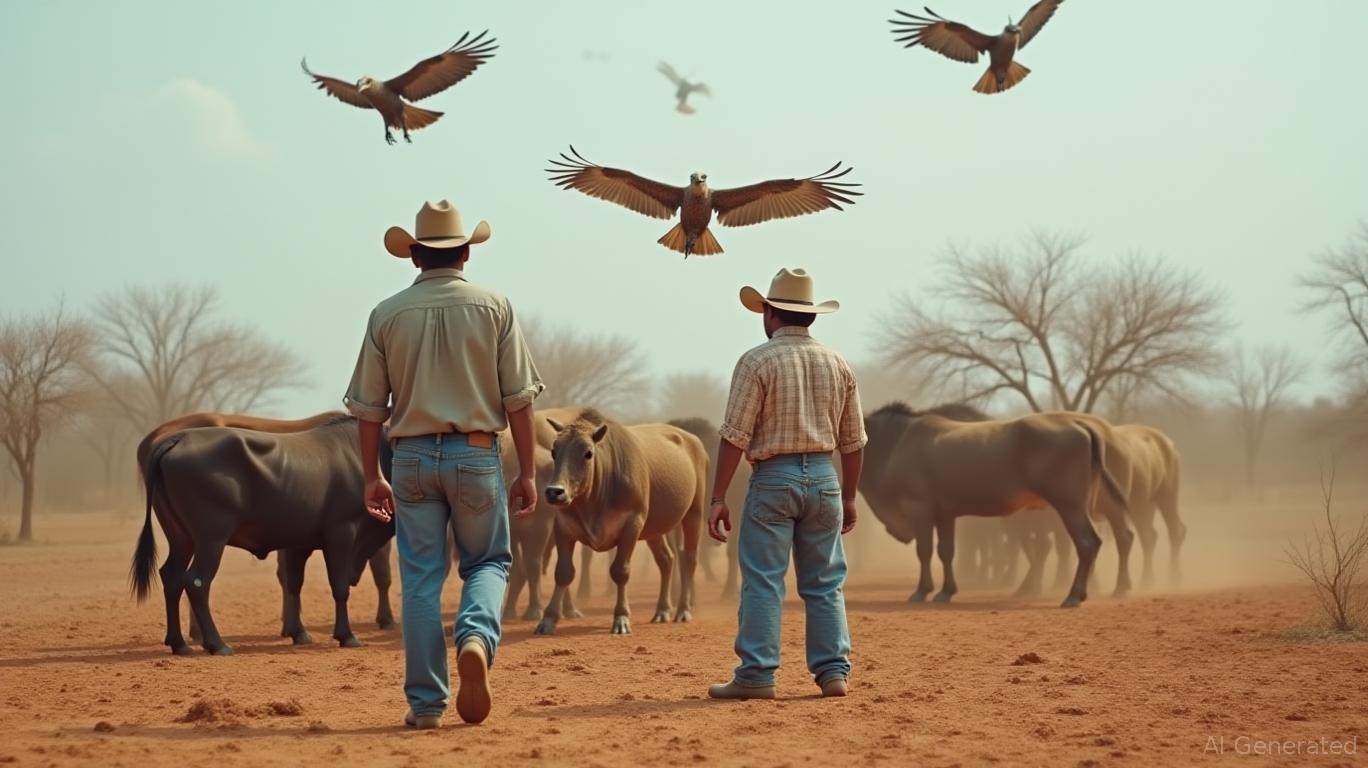Climate change drives an increase in vultures, leaving cattle ranchers without any safe haven
- U.S. cattle farmers face growing threats from northward-migrating black vultures, protected under the Migratory Bird Treaty Act, which attack calves and disrupt operations. - Climate change and human activity enable vultures to thrive in colder regions, exploiting roadkill, farms, and suburban sprawl for reliable food sources. - Farmers employ non-lethal deterrents like adjusted calving schedules and vulture effigies, but legal protections limit population control options. - Experts warn of escalating hu
American cattle ranchers are facing a growing challenge from black vultures, a federally protected species that is rapidly moving northward as a result of climate change and human expansion. Previously limited to the southeastern United States and parts of Latin America, these birds are now attacking young livestock and interfering with farm routines, leaving ranchers struggling to cope. Andrew Farnsworth, a visiting researcher at the Cornell Lab of Ornithology, noted that milder winters and shifting habitats have allowed black vultures to flourish in areas that were once inhospitable. "They excel at locating food and remembering those locations," he explained, pointing out that roadkill, cattle operations, and suburban growth have all boosted their food supply, according to
The fact that black vultures do not migrate seasonally makes the issue worse. Unlike many birds that travel with the seasons, black vultures settle and breed in new areas, establishing permanent populations. This has left ranchers like Tom Karr from Pomeroy, Ohio, with no escape. Ten years ago, Karr lost a calf to vultures and changed his calving season to later in the year, only to discover the birds stayed all year long. "They basically eat them alive," Karr said, describing the persistent threat. Joanie Grimes, who farms in Hillsboro, Ohio, has also changed her approach, keeping newborn calves close to barns for several days to reduce risk. "We've been dealing with these birds for 15 years, but keeping calves out of distant fields has made a difference," she told the AP.

The northward spread of black vultures is closely linked to larger environmental changes. Milder winters caused by climate change have enabled these birds to move into northern states. At the same time, human activities have created plentiful food sources, Farnsworth explained. Suburban expansion leads to more roadkill, and predictable cattle birthing seasons offer steady meals. The birds’ intelligence and ability to learn from each other make the problem worse, as groups of vultures share information about where to find food.
To keep the birds at bay, farmers are trying a variety of tactics. Annette Ericksen, who runs Twin Maples Farm in Milton, West Virginia, said she has not lost any animals to vultures but has kept a close eye on them for years. In some places, farmers are experimenting with fake vulture decoys and adjusting grazing patterns. Still, these efforts only provide limited relief. Because black vultures are protected under the Migratory Bird Treaty Act, lethal control is restricted, forcing ranchers to rely on non-lethal deterrents.
This situation underscores the unexpected effects of climate-related ecological changes. As black vultures continue to move north, cattle producers in the U.S. are under increasing pressure to find new ways to coexist. Experts caution that unless broader solutions—such as targeted habitat management or regulatory changes—are implemented, tensions between ranchers and these adaptable birds are likely to grow.
Disclaimer: The content of this article solely reflects the author's opinion and does not represent the platform in any capacity. This article is not intended to serve as a reference for making investment decisions.
You may also like
Solana News Today: Investors Abandon Bitcoin ETFs in Favor of Solana's Attractive Staking Returns
- Bitcoin ETFs saw $488M outflows led by BlackRock's IBIT , while Solana ETFs gained $44.48M as investors rotated into staking yields. - Coinbase reported $1.9B Q3 revenue driven by trading volumes and expanded staking services, contrasting ETF volatility. - Zynk secured $5M seed funding to develop stablecoin-based cross-border payment infrastructure, targeting USD/EUR/AED corridors. - Analyst Peter Brandt warned Bitcoin could test $60K support, but IBIT's $88B AUM suggests long-term ETF demand remains str

Ferrari's 499P Token: Enhancing Customer Loyalty in the Digital Era
- Ferrari launches Token 499P NFT with fintech Conio, targeting Hyperclub members for auction bids and exclusivity. - Q3 2025 results show €382M net income and €670M EBITDA, surpassing forecasts amid strong high-end model demand. - Strategy emphasizes loyalty through digital assets, with EU regulatory approval pending for the limited-edition token. - Project combines heritage with innovation, reflecting Ferrari's resilience after September market skepticism and regained investor confidence.

Noomez's Presale: Creating Rarity to Survive Meme Coin Volatility
- Noomez ($NNZ) launches 28-stage presale with fixed pricing and liquidity locks to mitigate meme coin risks. - 15% liquidity locks and third-party audits enhance trust, while real-time on-chain tracking ensures transparency. - Stage-based airdrops and referral bonuses incentivize participation, aligning with 2025 crypto trends. - Despite volatility concerns, structured deflationary design aims to sustain value, with 50% supply allocated to presale success.

Decred Skyrockets as EU Tightens Rules on Anonymous Transactions
